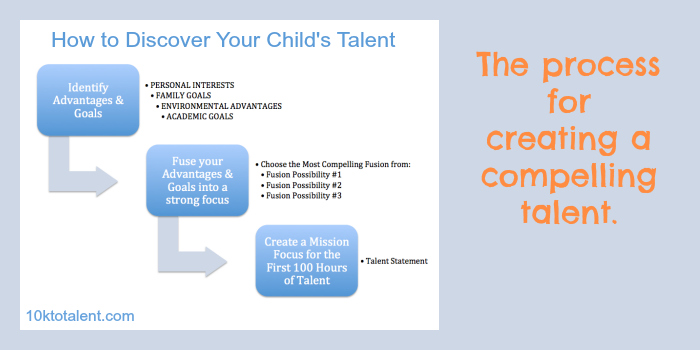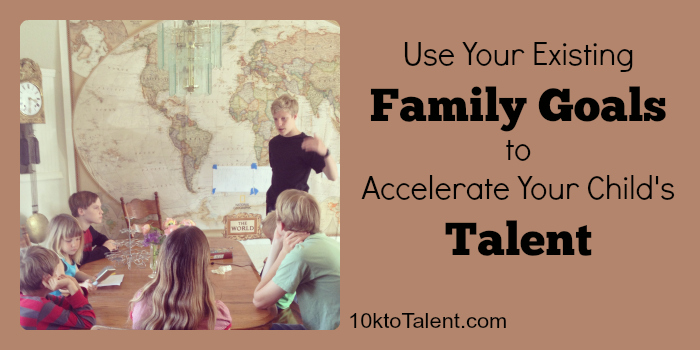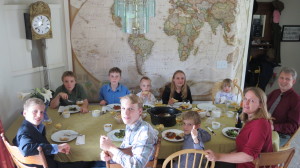Can your family’s unique set of strengths and quirky interests help your son or daughter’s long term talent? Yes.
Your family’s identity is one of the most overlooked assets for building talent in a child (tip: your family’s identity is what you think others would probably describe your family as). But if you understand how to use your family’s identity, you can use it as emotional jet-fuel. The younger the child, the more leverage you will get out of using your family’s identity to blast your child out of being in a state of being average. Harnessing academic goals and using personal interests are also part of the 10ktoTalent method, but it is the family’s identity that gives you the most emotional leverage in your child’s early years of talent.
Here’s a simple example of how you would enlist your family’s identity to push your child’s talent forward:
Imagine that your daughter has a serious core writing skill she is developing as part of her long-term talent. She takes her craft seriously. She is able to write with poise and conviction. Imagine also that your family’s identity is found in providing hospitality. Your family unit is known for being that hospitable family at church to whom everyone turns to whenever there is person or event that needs to be honored in an appropriate way. Your family knows how to get people together and you take great joy as a family unit in helping others to honor those important occasions in life.
Those two apparent disconnected pursuits could stay disconnected. And that’s how most people would see the situation. Most would look at the fact that your daughter is growing up in a hospitable family as completely the same as her growing up in a musical family…in other words your family’s identity is irrelevant. At best, it is meant for your daughter to tolerate or pass by your family’s identity as the proverbial ship in a dark night, while trying to find time for herself to carve her own way. At worst, it can erupt into serious family conflict, resolved by either the daughter or the family having to give up their focus in order to sacrifice for the other.
This the better way: you MAKE those two worlds of writing and hospitality connect. This requires some imagination, but not anything outside of a little effort. There are usually several ways that you could come up with to connect two worlds. One way would be to enlist your daughter’s writing skill to enhance your family’s already great strength in the area of hospitality. A writer needs something to write about and needs to write for someone. A young person especially needs quick feedback as to whether what she is doing is appreciated, or if it’s completely a talk to her bedroom wall. This immediate outlet for her writing is what you provide for her through your family identity. In practical terms, this would translate into such things as having her compose short biographical sketches of the people or events being honored for that occasion and in following up after with congratulatory and thank-you notes and summaries of the event for the rest of the people who could not be there. This range of events to be written for, and for which she would almost have free reign within the safety of her family’s sphere of influence, would be amazing. Typical events would be: birthday celebrations, retirement events, wedding showers, baby showers, memorial services, post-ordination receptions, visiting missionaries, receptions for guest speakers, etc. She can easily gauge the feedback she got from exercising her skill. All of this engagement through the use of her writing skills to provide value to others is guaranteed to emotionally super-charge her to want to take her writing skill to the next level.
Notice in the above example at how critical the use of her family’s identity and strength would be at a young age. If she were thirteen and wanted to do such things on her own, most likely she would be blocked (and correctly so) as being too young and inexperienced. Most likely she would not even have the vision or the social savvy to initiate on her own to such a service level to other people. But because it is her parents’ strength and joy to do hospitality, they can easily clear that way for her and protect her from any social danger. Eventually, yes, that daughter, without her parents’ involvement, might find a way on her own to get that involved, but that is not likely to be possible until she as at least sixteen or seventeen. The difference between her parents connecting her talent with her family, and her parents being disconnected from her talent growth is the difference of three years. It is probably even more than that as the developed skills compound in usefulness.
What is your family identity?


















